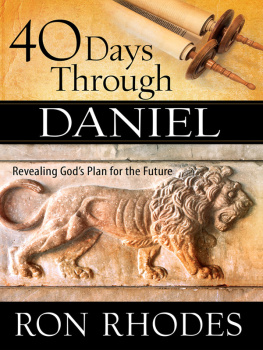This small-group study is for people who are interested in learning for themselves more about what the Bible says on various subjects, but who have only limited time to meet together. Its ideal, for example, for a lunch group at work, an early morning mens group, a young mothers group meeting in a home, a Sunday-school class, or even family devotions. (Its also ideal for small groups that typically have longer meeting timessuch as evening groups or Saturday morning groupsbut want to devote only a portion of their time together to actual study, while reserving the rest for prayer, fellowship, or other activities.)
This book is designed so that all the groups participants will complete each lessons study activities at the same time. Discussing your insights drawn from what God says about the subject reveals exciting, life-impacting truths.
Although its a group study, youll need a facilitator to lead the study and keep the discussion moving. (This persons function is not that of a lecturer or teacher. However, when this book is used in a Sunday-school class or similar setting, the teacher should feel free to lead more directly and to bring in other insights in addition to those provided in each weeks lesson.)
If you are your groups facilitator, the leader, here are some helpful points for making your job easier:
Go through the lesson and mark the text before you lead the group. This will give you increased familiarity with the material and will enable you to facilitate the group with greater ease. It may be easier for you to lead the group through the instructions for marking if you as a leader choose a specific color for each symbol you mark.
As you lead the group, start at the beginning of the text and simply read it aloud in the order it appears in the lesson, including the Insight boxes, which appear throughout. Work through the lesson together, observing and discussing what you learn. As you read the Scripture verses, have the group say aloud the word they are marking in the text.
The discussion questions are there simply to help you cover the material. As the class moves into the discussion, many times you will find that they will cover the questions on their own. Remember the discussion questions are there to guide the group through the topic, not to squelch discussion.
Remember how important it is for people to verbalize their answers and discoveries. This greatly strengthens their personal understanding of each weeks lesson. Try to ensure that everyone has plenty of opportunity to contribute to each weeks discussions.
Keep the discussion moving. This may mean spending more time on some parts of the study than on others. If necessary, you should feel free to spread out a lesson over more than one session. However, remember that you dont want to slow the pace too much. Its much better to leave everyone wanting more than to have people dropping out because of declining interest.
If the validity or accuracy of some of the answers seems questionable, you can gently and cheerfully remind the group to stay focused on the truth of the Scriptures. Your object is to learn what the Bible says, not to engage in human philosophy. Simply stick with the Scriptures and give God the opportunity to speak. His Word is truth (John 17:17)!
DISCOVERING
WHAT THE
FUTURE HOLDS
W ith all that is transpiring in the world, people cannot help but wonder what the future holds. Will there ever be peace on the earth? Will the nations learn how to live in harmony with one another? Will there ever be a peaceful resolution between Israel and the Palestinians? How long will the world live under the threat of terrorism? Is a one-world ruler on the horizon?
What does the future hold for the various nations of the world? Can we know? If so, when will it happen? Where will it happen? And where do we as individuals fit into all this?
The Old Testament prophet Amos wrote, Surely the Lord GOD does nothing unless He reveals His secret counsel to His servants the prophets (Amos 3:7). If this is true, then God already has revealed to His people what the future holds. Weve no need to worry or wonder, because Hes given us a sneak preview.
Together, were going to explore the prophecies of Daniel, which give us a clearer picture of the future than any other book of the Bible does. And as we learn, as your faith and knowledge increase, youll find your questions replaced with trust in the One who holds the future in His hands.
If you want to construct a building that will stand firm and solid through an earthquake or any other cataclysmic event, you need to work with an experienced architect whose blueprints are followed to the letter.
God, of course, is the Architect of history and of the future, and the book of Daniel the prophet reveals His blueprints. In fact, when you understand the prophecies laid out in Daniel, you discover that every other prophecy in the Bible fits somewhere into His blueprints.
Therefore, if you want to build a solid understanding of the future and know what will happen in the end of the days, you need to begin with the prophecies laid out in the book of Daniel.
Many people have a tendency to throw up their hands the moment Daniel is mentioned and say, But how can a person understand this book? Its so confusing! The problem is that many bring their own interpretations to this book, rather than allowing the interpretations given in the book to speak for themselves.
In the light of this, lets see what we can discover simply by observing the text carefully, without bringing any of our interpretations to it.
OBSERVE
Through the course of this study, we will look at each of the prophetic passages in Daniel that give insight into what will take place in the future.
Our first text is Daniel 2:25-45. Since we are breaking into the middle of the chapter, lets first look at the context of this passage: Nebuchadnezzar, the king of Babylon, has had a disturbing dream, which none of his wise men can interpret. They say they cannot interpret the dream because they dont know what the king dreamedand Nebuchadnezzar wont tell them. Consequently, the king is threatening to have them all put to death, including four Jewish captives who now serve Nebuchadnezzar.
When Daniel, one of the four Jewish prisoners, hears of this, he asks for time to seek counsel from the God of heaven so that God might reveal to him the dream and its interpretation. Here is where we pick up the story.
Leader:Read aloud Daniel 2:25-30. As you read, have the group
draw a cloud, like this , around every reference to thedream, mystery, orvision.
, around every reference to thedream, mystery, orvision.
put a?



















 , around every reference to thedream, mystery, orvision.
, around every reference to thedream, mystery, orvision.